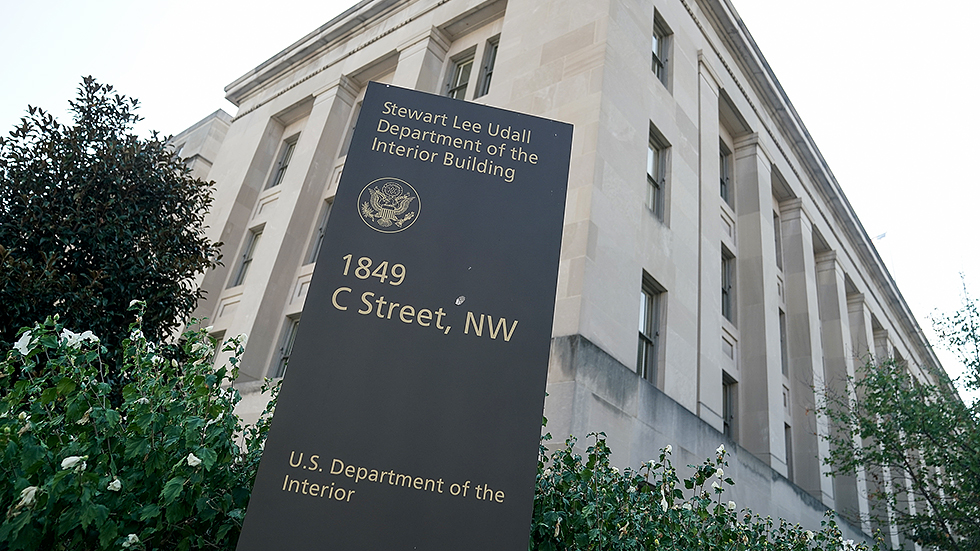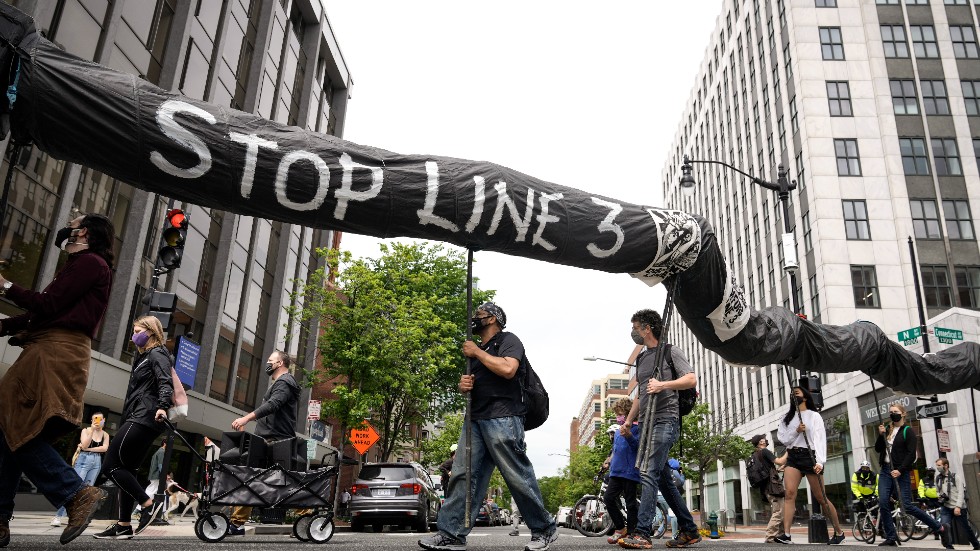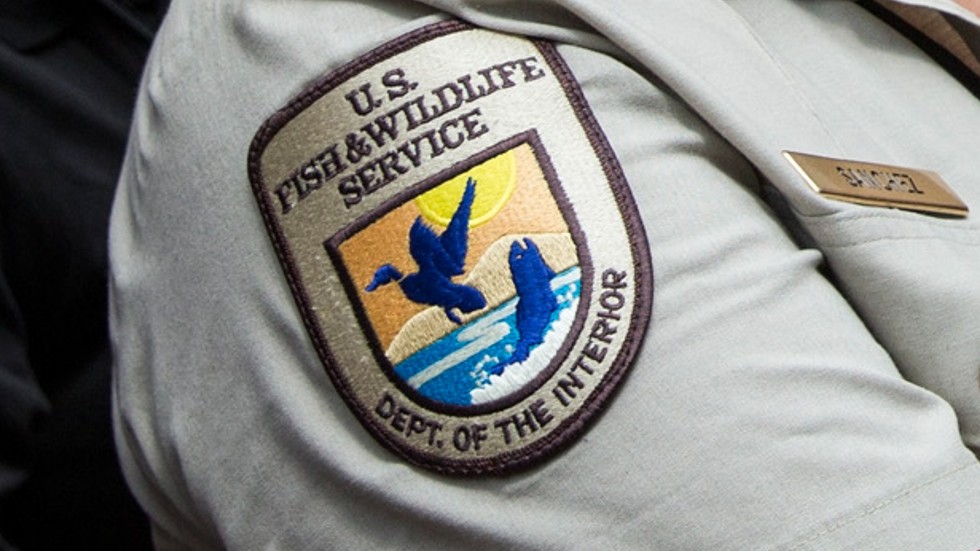Overnight Energy & Environment — Presented by the American Petroleum Institute — Interior halts Trump-era bird protection rollback
Welcome to Wednesday’s Overnight Energy & Environment, your source for the latest news focused on energy, the environment and beyond. Subscribe here: digital-staging.thehill.com/newsletter-signup.
Today we’re looking at a migratory bird treaty that’s the latest Biden administration environmental reversal from the Trump years, the completion of the Line 3 pipeline and the U.S. Fish and Wildlife Services announcement of nearly two dozen extinct species.
For The Hill, we’re Rachel Frazin and Zack Budryk. Write to us with tips: rfrazin@digital-staging.thehill.com and zbudryk@digital-staging.thehill.com. Follow us on Twitter: @RachelFrazin and @BudrykZack.
Let’s jump in.
Interior Department to nix Trump rollback of bird protections

The Biden administration is officially revoking a Trump-era rule that made companies less likely to face penalties for killing migratory birds.
The White House on Wednesday withdrew the changes the Trump administration made to how the Migratory Bird Treaty Act (MBTA) — a more than 100-year-old law that makes it illegal to kill migratory birds — is implemented.
The Trump administration’s rule removed penalties for “accidental” or “incidental” bird deaths, arguing that it wouldn’t be fair to levy penalties in those situations. But it acknowledged even then that the rule could cause companies to forego best practices to limit incidental bird deaths.
Harm is considered incidental when it is not intentional, but also not unexpected, according to the National Oceanic and Atmospheric Administration.
What’s next?: The Interior Department said it will make public a final rule nixing the Trump-era regulation on Thursday, with publication in the Federal Register slated for Monday.
By revoking the rule, the department will return to interpreting the law as prohibiting incidental harm and being able to use its direction in enforcement. The agency also said it will seek comments on a potential rule on incidental harm of migratory birds.
It will also issue an order establishing criteria for prioritizing enforcement.
The MBTA has been used to impose financial penalties on companies for environmental destruction, including the 2010 Deepwater Horizon oil spill.
After that spill, BP pleaded guilty to violating the MBTA, in addition to other charges, and had to pay $100 million to support wetlands conservation and restoration.
When it pushed to remove penalties for incidental harm, the Trump administration had argued against such fees.
Read more about the announcement here:
Canadian firm says controversial Line 3 pipeline will be operational Friday

Canadian company Enbridge Inc. on Wednesday announced that it has “substantially” completed the replacement Line 3 segment of its pipeline in Minnesota, with Friday as the projected operational date.
“Line 3 was developed and executed with the most state-of-the-art approach to design, construction and environmental management,” Enbridge President and CEO Al Monaco said in a statement. “We’re also very proud of the relationship of trust we’ve built with communities along the right-of-way in both Canada and the United States. Our goal is to continuously live up to the trust that all of our stakeholders have placed in us.”
The Justice Department in 2016 entered a consent decree requiring the replacement of the pipeline segment, which had substantially corroded since its construction in 1968.
The story so far: The pipeline has been the subject of intense opposition from local conservation and Indigenous groups. Opponents have said it presents an unacceptable environmental risk in the form of the carbon-heavy tar sands oil it will carry as well as the disruption of local habitats and waters.
In addition to groundwater, local Indigenous people have said the segment will threaten lands they rely on for hunting and wild rice cultivation.
In a statement to The Hill on Friday, a spokesperson for the Indigenous Environmental Network said the pipeline’s opponents will continue their work.
“It’s with a heavy heart we receive the news that the U.S. has tragically failed once again to honor our treaties and protect the water that sustains all life on Mother Earth,” Jennifer Falcon said. “The Line 3 fight is far from over, it has just shifted gears. Do not think we are going quietly into the night, we will continue to stand on the frontlines until every last tar sands pipeline is shut down and Indigenous communities are no longer targeted but our right to consent or denial is respected.”
Read more about the announcement here:
A MESSAGE FROM API
These relationships…help us plan for the future,” says Andreas Shamel, of Ford Motor Company. That future includes lower CO2 emissions, achieved through partnerships with U.S. natural gas and oil companies.
11 birds, 2 fish among 23 species declared extinct

The U.S. Fish and Wildlife Service (FWS) on Wednesday declared 23 species extinct, including 11 birds and two fish.
Notable among the 23 extinctions is the ivory-billed woodpecker, one of the better-known species to now be extinct.
“This is not an easy thing,” Amy Trahan, the FWS biologist who declared the ivory-bill woodpecker extinct, said. “Nobody wants to be a part of that.”
“Just having to write those words was quite difficult. It took me a while,” she added.
There were also eight Hawaiian birds declared extinct, including the Kaua’i ’o’o and the Maui ’akepa.
Scientists warned that the increase in climate change could push more animals onto the extinction list, according to a statement released by the Department of the Interior.
And the worst may be yet to come: “With climate change and natural area loss pushing more and more species to the brink, now is the time to lift up proactive, collaborative, and innovative efforts to save America’s wildlife,” Interior Secretary Deb Haaland said in the statement.
“The Endangered Species Act has been incredibly effective at preventing species from going extinct and has also inspired action to conserve at-risk species and their habitat before they need to be listed as endangered or threatened. We will continue to ensure that states, Tribes, private landowners, and federal agencies have the tools they need to conserve America’s biodiversity and natural heritage.”
Read more about the the extinctions here:
Senate prepares to vote on embattled public lands nominee

The Senate is teeing up a vote on a controversial Interior Department nominee.
On Tuesday, the Senate filed cloture on the nomination of Tracy Stone-Manning, a controversial pick to lead the Bureau of Land Management (BLM).
Stone-Manning has been met with fierce resistance from Republicans because of a decades-old tree spiking incident.
Stone-Manning has said she sent a letter threatening the spiking on behalf of activists, but has said she didn’t have advanced knowledge of the incident.
Democrats are expected to be united about her nomination, with swing vote Sen. Joe Manchin (D-W.Va.) voting for her in committee.
Relatedly: The chamber on Wednesday voted to limit debate on the nomination of Robert Anderson to be the Interior Department’s top lawyer and were voting on whether to confirm him while this newsletter was being written.
CLIMATE PROGRESS WITHOUT A CEPP?
White House climate adviser Gina McCarthy argued that “tremendous” climate progress can be made even without a key clean energy program that has become a sticking point in infrastructure negotiations.
“The Clean Energy Payment Plan or whatever it ends up being called cause the name changes every day or so — this idea of creating a real compliance strategy for utilities that’s both penalties and investments is an important part of this, but there are other way also to get at this in terms of regulatory constraints,” McCarthy said during a webinar put on by E2.
She also highlighted “other opportunities for investment strategies”
“It doesn’t mean I don’t want the Clean Energy Payment Plan and it doesn’t mean we’re going to give it up without lots of kicking and screaming, but it does mean that I don’t think we need to have every penny in here to make tremendous progress,” the top climate adviser said.
Her comments come as key swing vote Sen. Joe Manchin (D-W.Va.) has expressed opposition to the program in which utilities would be paid to switch to cleaner energy sources.
They also mark a tonal shift from past remarks in June where she highlighted the push towards clean electricity as a non-negotiable.
A MESSAGE FROM API
These relationships…help us plan for the future,” says Andreas Shamel, of Ford Motor Company. That future includes lower CO2 emissions, achieved through partnerships with U.S. natural gas and oil companies.
LET THE GOOD TIMES ROLLS
Rolls-Royce announced on Wednesday that it will only produce electric cars by 2030, Reuters reported.
The BMW-owned brand said its first fully electric-powered car will be on the market in the fourth quarter of 2023.
“With this new product we set out our credentials for the full electrification of our entire product portfolio by 2030,” Rolls-Royce CEO Torsten Muller-Otvos said in a statement.
“By then, Rolls-Royce will no longer be in the business of producing or selling any internal combustion engine products,” Muller-Otvos said.
With the move, Rolls-Royce joins other premium car brands including Volkswagen’s Bentley and Jaguar’s Land Rover in switching to electric cars in the near future, Reuters reported.
BMW has not set an end date for producing vehicles that run on fossil fuels, but the car manufacturer has set a goal for 50 percent electric vehicle production by 2030, according to Reuters.
BMW subsidiary Mini announced in March that it will go all-electric by the end of the decade.
Read more about the announcement here:
WHAT WE’RE READING
Nigerians could see justice over Shell oil spills after six decades, Floodlight reports
How Republicans blocked cities from advancing climate solutions, Vox reports
‘Disruptive’ Shutdown Seen as Crippling EPA Powers and Economy, Bloomberg reports
USDA pledges billions for climate-smart farm projects, resilience, E&E News reports
ICYMI
- Here are the 23 species the Interior Department declared extinct
- Pope praises young activists challenging world leaders on climate
- FAA unveils new system to reduce planes’ times on taxiway
- NOAA bans swimming with Hawaii’s nocturnal spinner dolphins
- Greta Thunberg: Last 30 years of climate action amount to ‘blah, blah, blah’
That’s it for today, thanks for reading. Check out The Hill’s energy & environment page for the latest news and coverage. We’ll see you Thursday.
{mosads}
Copyright 2024 Nexstar Media Inc. All rights reserved. This material may not be published, broadcast, rewritten, or redistributed..









